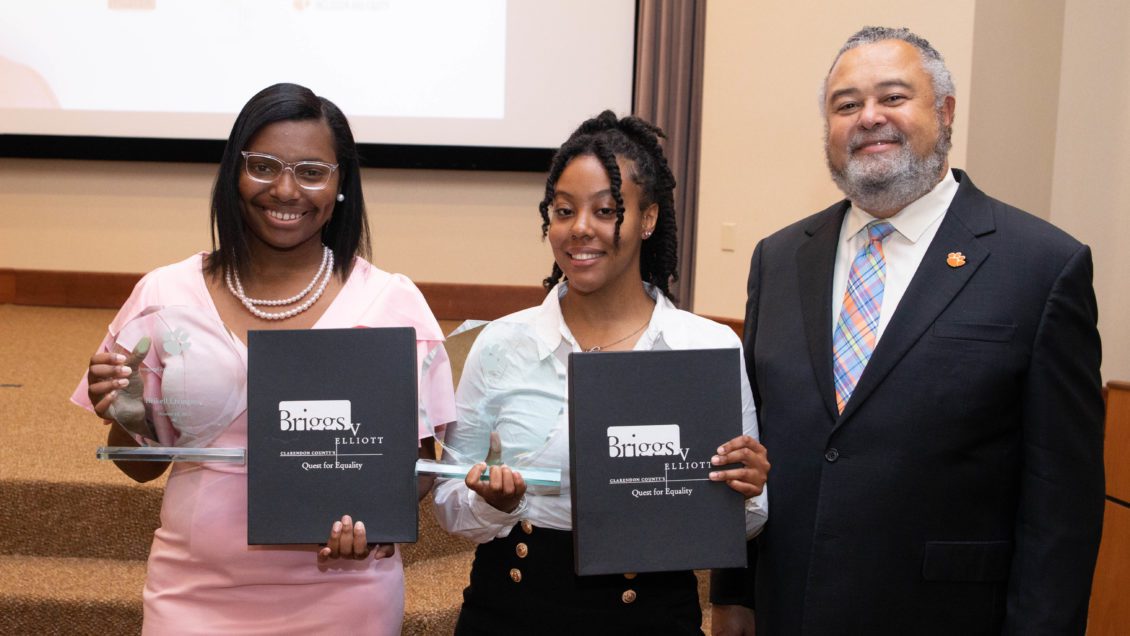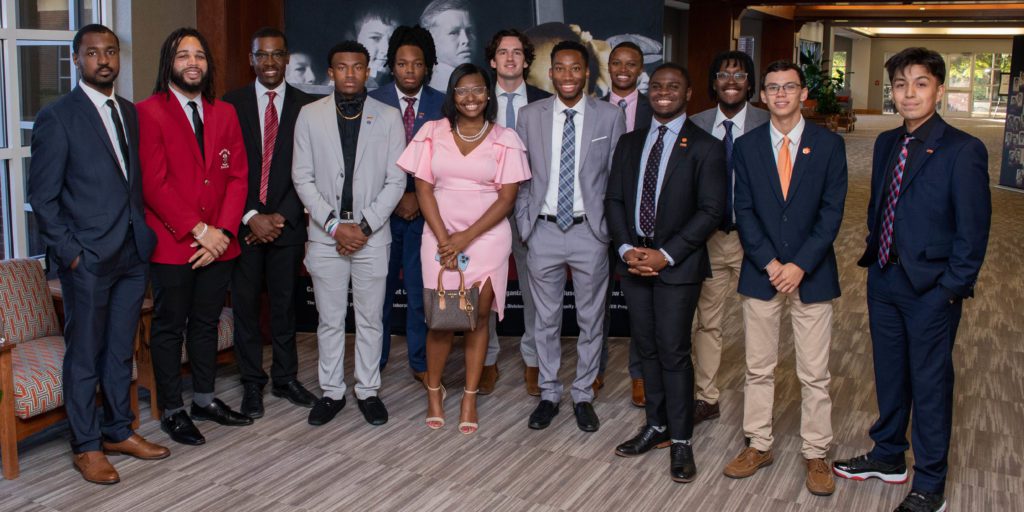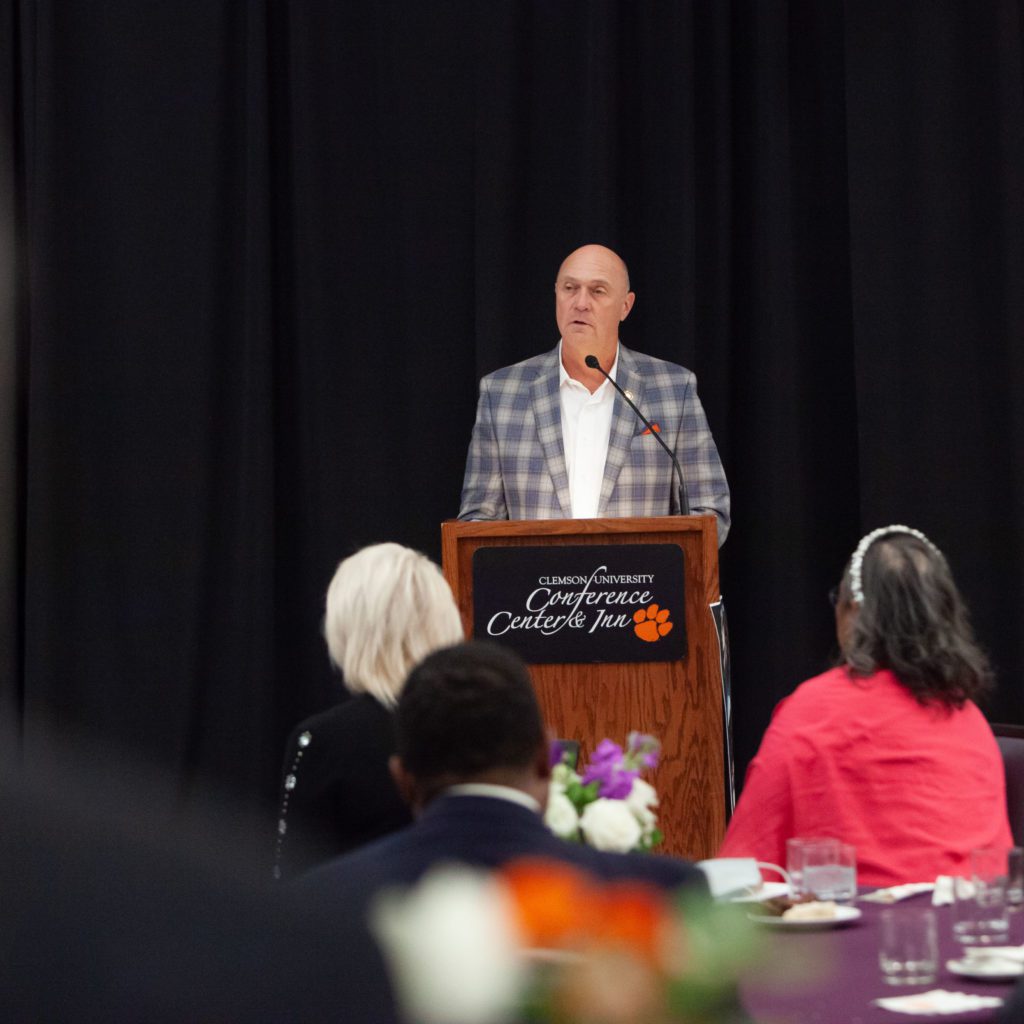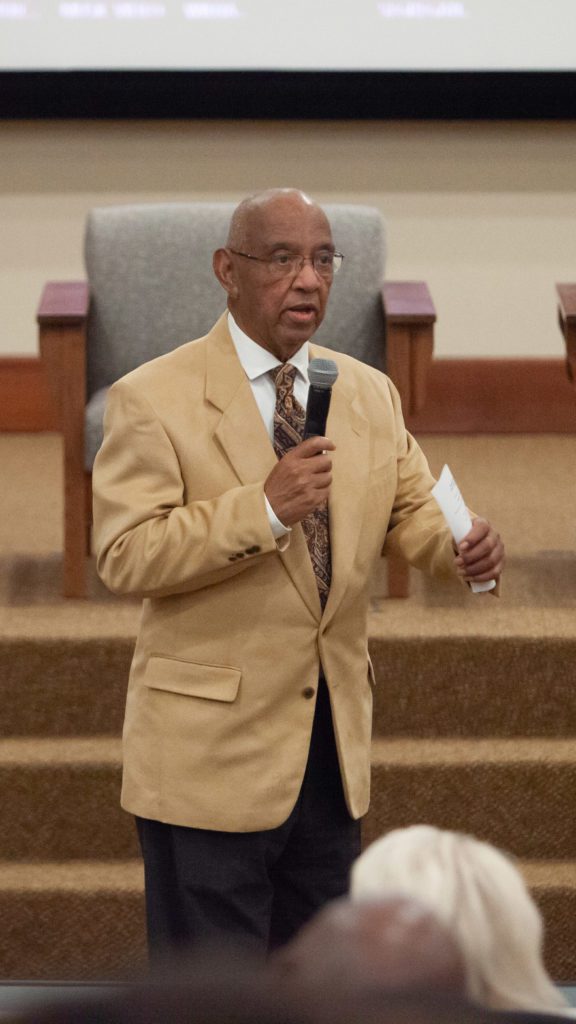
Clemson leadership presented named scholarships created in honor of South Carolina civil rights heroes to two Clemson students at the second annual Joseph and Mattie De Laine Lecture Series.
The scholarship recipients, Brikell Livingston of Manning and Jasmine McDaniel of Columbia, attended the event, which was bookended by wall-to-wall historical excerpts and a feature film detailing the lives of Joseph De Laine, Mattie De Laine and Reverdy Wells, for whom the scholarships are named.
Roy Jones serves as a Provost Distinguished Professor and executive director of Call Me MiSTER®, a program based at Clemson University that works to increase the pool of Black male educators in the teaching profession. Jones served as host of the event, which highlights the vital roles that several South Carolinians played in shaping the state and country’s drive for equality.
Joseph and Mattie De Laine
Joseph De Laine was born in Manning, South Carolina, and served as the principal of Liberty Hill School and pastor of the Spring Hill Circuit of the A.M.E. Church in Summerton. He encouraged a group of citizens, including Levi Pearson and Harry Briggs, to file suit in 1948 after being denied transportation for Black children who walked nine miles to schools designated for them. Joseph and his wife, Mattie, worked with then-chief legal counsel to the NAACP, Thurgood Marshall, who would go on to become the first Black U.S. Supreme Court justice.
The lecture series serves as the public face for the ongoing work of Jones and Clemson Libraries’ to document and archive South Carolina civil rights history. Jones said the scholars recognized at the event will be torch bearers for the cause championed by the De Laines and Wells, so he was pleased to see that the weight of sacrifice and commitment was on full display for the recipients that evening.
“We were thrilled to be able to recognize both scholarship recipients at an event attended by so many members of the De Laine and Wells families,” Jones said. “Brikell and Jasmine will be the first of many to be honored with a scholarship so steeped in South Carolina history; it is vital that they understand that history and work to both honor and communicate it to future generations of Clemson students.”
Livingston, the recipient of the Joseph and Mattie De Laine Scholarship, attended Scotts Branch High School in Summerton, the same school that figures prominently into South Carolina’s fight for school desegregation. The scholarship is designed specifically for education majors, and Livingston is an elementary education major involved in the Call Me MiSTER cohort.

McDaniel received the Reverdy Wells Scholarship, which is named for the senior class president at the then all-Black Scotts Branch High School. Wells’ frustration with the school’s conditions motivated him to organize a group of students to present their concerns to De Laine and a group of parents and citizens that would go on to create the original petition that would lead to the Briggs v. Elliott case, which would in turn become the first of five cases combined in the landmark Brown v. Board of Education case.
McDaniel graduated from Columbia High School and is currently a psychology major with plans to pursue a career in psychiatry.

Clemson University President James P. Clements and Executive Vice President for Academic Affairs and Provost Robert H. Jones were on hand to discuss the importance of the De Laine lecture and its role in Clemson’s work to shed light on South Carolina history. Daniel Ocampo, a freshman in Call Me MiSTER’s Clemson cohort, also spoke at the event about his love of history and social studies, and how an event such as the De Laine Lecture Series can use history to help put current events in context.
Max Allen, senior vice president and chief of staff and interim chief diversity officer and special assistant to the president for inclusive excellence at Clemson University, presented the scholarships to Livingston and McDaniel. He said the event highlights vital work undertaken by Clemson University to understand and document the history of education in South Carolina and its place in the national conversation around inclusion in education.

“This event distinguishes itself because it unearths South Carolina history related to the national fight for civil rights that has been either misunderstood, downplayed or forgotten over the intervening decades,” Allen said. “It is powerful night to witness because of its ability to bring together the descendants of those who lived that history and the educational context it provides.”
The Lecture program also featured the premiere of a film, “From Segregation to Justice,” which is a dramatization of events involving the De Laine family, Wells and other key players in the lead up to the Briggs v. Elliott court case. The film was produced and directed by Zebulun Dinkins, a graduate of Claflin University and the inaugural class of its Call Me MiSTER program. Dinkins is currently responsible for technology in the Clarendon County School District central office.
Jones said the second year of the De Laine lecture was a natural evolution of the event, and he looks forward to continuing it as a complement to the archival work still underway.
“I am heartened by the support we have received from the University on this work to educate all people about the incredible sacrifice and commitment of citizens of South Carolina,” Jones said. “They worked to transform the educational landscape around them and unwittingly changed our entire country. We certainly look forward to continuing this work and this event in the future so that this history and its many lessons are never forgotten.”
Get in touch and we will connect you with the author or another expert.
Or email us at news@clemson.edu
